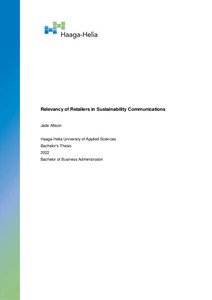Relevancy of Retailers in Sustainability Communications
Allison, Jade (2022)
Allison, Jade
2022
All rights reserved. This publication is copyrighted. You may download, display and print it for Your own personal use. Commercial use is prohibited.
Julkaisun pysyvä osoite on
https://urn.fi/URN:NBN:fi:amk-2022053013007
https://urn.fi/URN:NBN:fi:amk-2022053013007
Tiivistelmä
This thesis aimed to discover the relevancy of retailers in the commissioning company's sustainability communication strategy. Through researching this topic, the researcher aimed to discover the importance of sustainability and its communication for retailers and their consumers and what types of content they would like to receive.
The theoretical portion of this thesis focused on understanding sustainability and how it can be communicated. The researcher also looked into how sustainability communications can impact brand image, consumer behavior, and what leads to greenwashing.
The research was conducted in two phases to obtain primarily quantitative data. The first phase of the study was to conduct a survey. The survey was emailed to all of the commissioning company's retailers. Only 19 companies responded to the survey. Most of the respondents were based in Europe; however, two respondents were in the USA and China. The survey was created in Webropol and analyzed in SPSS and Excel. Through the survey, the researcher received data to use in the second phase of the research. The second phase compared the retailer's sustainability values to an existing company- performed survey results.
The responses showed that there was room to improve the company's sustainability communication; however, the data collected showed an interest from retailers in participating. The retailers shared what they are doing for their sustainability communications and the marketing activations they use. Overall, the data showed that the commissioning company has various options in how they can choose to communicate through their retailers.
The commissioning company already has established information about various sustainability topics. The recommendation the researcher formulated based on the survey data, and the commissioning company's channels are to share their materials with their retailers so that their consumers could find this information whenever they are interacting with their products and services regardless of if they go through retailers or the commissioning company's own channels.
The theoretical portion of this thesis focused on understanding sustainability and how it can be communicated. The researcher also looked into how sustainability communications can impact brand image, consumer behavior, and what leads to greenwashing.
The research was conducted in two phases to obtain primarily quantitative data. The first phase of the study was to conduct a survey. The survey was emailed to all of the commissioning company's retailers. Only 19 companies responded to the survey. Most of the respondents were based in Europe; however, two respondents were in the USA and China. The survey was created in Webropol and analyzed in SPSS and Excel. Through the survey, the researcher received data to use in the second phase of the research. The second phase compared the retailer's sustainability values to an existing company- performed survey results.
The responses showed that there was room to improve the company's sustainability communication; however, the data collected showed an interest from retailers in participating. The retailers shared what they are doing for their sustainability communications and the marketing activations they use. Overall, the data showed that the commissioning company has various options in how they can choose to communicate through their retailers.
The commissioning company already has established information about various sustainability topics. The recommendation the researcher formulated based on the survey data, and the commissioning company's channels are to share their materials with their retailers so that their consumers could find this information whenever they are interacting with their products and services regardless of if they go through retailers or the commissioning company's own channels.
